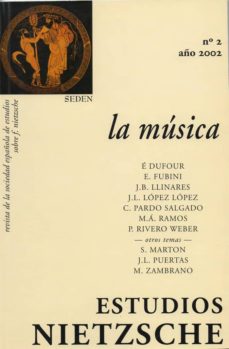Nietzsche: esculpiendo los sonidos de la aurora
DOI:
https://doi.org/10.24310/EstudiosNIETen.vi2.8794Abstract
Nietzsche, el filósofo de extraña voz, escribe su primer libro desde el espíritu de la música. Desde ese espíritu, el filósofo discurre dibujando para la imaginación del lector, también para su entendimiento, cómo tuvo lugar el nacimiento de la tragedia en la música. Nietzsche recuerda que, una vez, la esencia de la música fue la esencia del mundo, pero no es ya esa esencia ni sus avatares en manos de la filosofía, el espíritu en el que el filósofo asienta su voz. Partiendo de esta reflexión, este ensayo atiende a las relaciones entre música y filosofía que considera el filósofo alemán.
Downloads
Metrics
References
Lohman, J., Mousiké und Logos, Musikwissenschaftliche Verlags, Stuttgart, 1970. Klossowski,P., «Nietzsche, le polythéisme et la parodie», en Un si funeste désir, Gallimard, Paris, 1963, pp. 202-204.
Nietzsche, F., Correspondencia I-VI. (CO). Director ed. Luis E. de Santiago Guervós. Madrid : Trotta, 2005- 2012.
Nietzsche, F., Fragmentos Póstumos I-IV (FP). Director ed. Diego Sánchez Meca. Madrid: Tecnos, 2006-2010.
Nietzsche, F., Obras Completas, I-IV (OC ). Director ed. Diego Sánchez Meca. Madrid: Tecnos, 2011-2016.
Nietzsche, F., Obras Completas, I-IV (OC ). Director ed. Diego Sánchez Meca. Madrid: Tecnos, 2011-2016.
Downloads
Published
How to Cite
Issue
Section
License
As of issue 21 (2021) this journal is published only in open access (diamond route).
From that number 21, like the previous numbers published in NIETZSCHE STUDIES, they are subject to the Creative Commons Acknowledgment-NoComercia-ShareIgual 4.0 license, the full text of which can be consulted at <http://creativecommons.org/licenses/by-nc-sa/4.0 >
It is the responsibility of the authors to obtain the necessary permissions of the images that are subject to copyright.
This work is licensed under a Creative Commons Attribution-NonCommercial-ShareAlike 4.0 International License.
Copyright generates two different rights: moral rights and patrimonial rights that EJFB recognizes and respects. Moral rights are those relating to the recognition of the authorship. They are rights of a personal nature that are perpetual, inalienable, unseizable and imprescriptible as consequence of the indivisible union of the author and his/her work.
Patrimonial rights are those that can be derived from the reproduction, distribution, adaptation or communication of the work, among others.







11.png)
